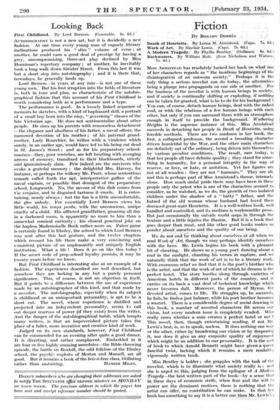Looking Back
First Childhood. By Lord Berners. (Constable. Ss. 6d.)
Auromogrixpny is not a new art, but it is decidedly a new fashion. At one time every young man of vaguely literary inclinations produced his " slim " volume of verse ; at another, he could earn a good deal of prestige by having a grey, uncompromising, three-act play declined by Miss Horniman's repertory company ; at another, he inevitably took a long walk down Sinister Street. From this last it was but a short step into autobiography ; and it is there that, nowadays, he generally lands up.
Lord Berners—in years at any rate—is not one of these young men.' But his first irruption into the fields of literature
is, both in tone and plan, so characteristic of the autobio- graphical fishion that this account of his First Childhood is Worth considering both as a performance and a type.
The performance is good. In a loosely linked sequence of memoirs he sketches, with a kind of haphazard skill, a portrait of a small boi born into the easy, " governing " classes of the late Victorian age. He does-not sentimentalize about other people. He sizes up his parents with remorseless detachment —the elegance and aloofness of his father, a naval officer, the narrowed deVotion of his mother ;' of his paternal grand- mother, Lady Bourchier, he Mites with a virulence which surely, in an earlier age,- would have led to his being cut dead in St. James's Street ; and as for his preparatory school- masters—they, poor wretches, are left bristling with avenging arrows of memory, transfixed to their blackboards, utterly and ignominiously slain. Few indeed are the survivors who evoke a grateful memory : the delightful Mrs. Harvey, for instance, or perhaps the willowy Mr. Pratt, whose sententious remark called 'forth the apt, inteipretative guffaw of the naval captain, or possibly that demigod of the preparatory school, Longworth. No, the savour of this dish comes from verjuice, and in disguised tartness it excels. It is enter- taining, nearly always ; but the fun is a little uncomfortable, the glee unholy. For essentially Lord Berners views his little world, his temps perdu, with the unconscious, unripe cruelty of a child. His afflicted grandfather, groaning all day in a darkened room, is apparently no more to him than a somewhat comical curiosity ; his cloacal practical joke on the hapless Mademoiselle Bock rather more so. Fairer game is certainly found in Elmley, the school to which Lord Berners was sent after this last gesture, and the twelve chapters which recount his life there make a very convincing and consistent picture of an unpleasantly and uniquely English institution. What a life ! Does it go on like this today ? If the secret code of prep-school loyalty persists, it may be twenty years before we know.
But First Childhood is interesting also as an example of a fashion. The experiences described are well described, but somehow they are lacking in any but a purely personal significance. This, of course, is not an objection in itself. But it points to a difference between the use of experience made by an autobiographer of this kind, and that made by a novelist. The autobiography, especially when its subject is childhood or an unimportant personality, is apt to be a short cut. The novel, where experience is distilled and projected into an indey endent personality, seems to call out deeper reserves of power (if they exist) from the writer. And the danger of the autobiographical habit, which tempts many writers, is that an impoverished picture takes the place of a fuller, more inventive and creative kind of work.
Judged on its own standards, however, First Childhood can be commended for an evening after quite a good dinner. It is diverting, and rather complacent. Embedded in it are four or five highly amusing anecdotes—the Bible-throwing episode, the battle on Boxhill, the odd folklore of the Elmley school, the psychi? exploits of Merton and Mansell, are all good. But it remains a book of the bric-a-brac class, titillating
















































 Previous page
Previous page